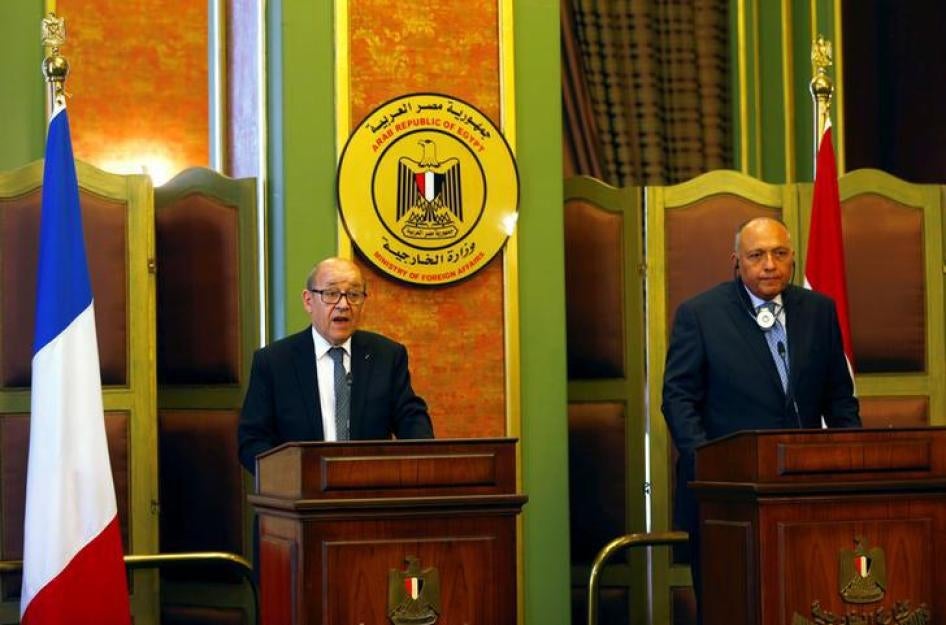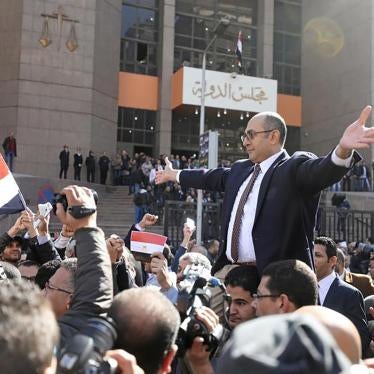French President Emmanuel Macron may be a fresh new face, but if the visits to Cairo by former Defense Minister Sylvie Goulard (June 5) and Foreign Minister Jean-Yves Le Drian (June 8) are anything to go by, we seem set for the same indulgence of unabated repression.
“Military and security cooperation” were at the heart of Goulard’s meeting with President Abdel Fattah al-Sisi on June 5. Her visit followed a phone conversation between Macron and al-Sisi shortly after the May 26 Islamic State attack that killed 29 Egyptian Copts in Upper Egypt’s Minya province. French-supplied Rafale fighter jets – part of recent French arms sales contracts to Egypt worth more than 6 billion Euros – got their “baptism of fire” when Egypt responded to the Minya attack with airstrikes against reported Islamic State targets in the eastern Libyan city of Derna.
Le Drian met with al-Sisi and other Egyptian officials a few days later, on June 8. He had made eight visits to Cairo in the previous three years as defense minister under former President Francois Hollande, he said at a joint news conference with his Egyptian counterpart, Sameh Shoukry. One of those visits was in February 2015, when Le Drian signed with his Egyptian counterpart a contract to supply 24 Rafale jet fighters – the first foreign order for the super-expensive warplane that the manufacturer, Dassault, had been shopping around for some time.
Meeting reporters with Shoukry in June with his foreign minister hat on, Le Drian said France “always stands beside Egypt in times of difficulty and particularly at a time at a moment when Egypt is faced with grave menace,” and singled out Libya as a particular topic of concern.
About Egypt’s dreadful human rights situation, not a word from either Goulard or Le Drian, or anyone in the French government for that matter – at least nothing they’ve shared publicly. Le Drian said he brought from President Macron “a message of support” for unspecified “reforms underway.” Neither Le Drian nor Goulard commented on the highly repressive NGO legislation that al-Sisi signed into law on May 29. So far France has confined itself publicly to a vague expression of “concern” when the Egyptian Parliament passed the law in November. Nor did Le Drain or Goulard have anything to say about Egypt’s recent blockage of scores of news websites – 62 at latest count since May 24 – and arrests of scores of peaceful activists for Facebook and other social media posts, some on spurious terrorism charges.
One of those arrested was prominent rights lawyer and former presidential candidate Khalid Ali. He is now out on bail but facing felony charges for allegedly “committing a scandalous act”—namely, raising his middle finger during a peaceful street protest. The charge carries a sentence of up to one year and Ali’s lawyers say a conviction could be used to make him ineligible for run for president in 2018.
Meanwhile Egyptian military courts have been busy trying civilians – more than 7400 since al-SIsi issued a decree in October 2014 vastly expanding military court jurisdiction. Military courts do not provide even the limited due process protections available in Egypt’s ordinary criminal courts. The military courts have issued death sentences against 60 individuals. Six executions have been carried out – including three men who had already been in custody at the time of the alleged crime for which they were convicted. In those cases Human Rights Watch investigated, the men were “disappeared” for weeks and claimed that their confessions had been coerced by abuse and dictated to them by security officers.
The silence of Goulard and Le Drian – and Macron – is fully in line with France’s indulgence under Hollande of al-Sisi’s repressive policies. Back in February, answering National Assembly questions in his capacity as defense minister, Le Drian insisted that he “would not debate whether Mohamed Morsi was less of a dictator” than al-Sisi and that Egypt’s stability was essential for the entire region. “I am convinced that France now has a true partnership with Egypt” that would “reinforce democracy in the long run,” he said. A recent report quoted one unnamed French diplomat characterizing the position of “some EU member states” as, “if you want a strong, stable Egypt, you cannot have a democratic Egypt.”
The Goulard and Le Drian visits to Cairo come at a time when “Libya is a priority for France,” an unnamed French diplomat told Reuters. Egypt and the UAE have been among the key international backers of the Libyan National Army commander in the east, Khalifa Haftar, whose forces have been battling Islamist and other armed groups in eastern Libya but who also has refused to support the UN-backed Tripoli-based Government of National Accord of Prime Minister Fayez Seraj.
French support for Haftar, mostly in the form of sharing intelligence, reportedly reflected policies of the Defense Ministry under Le Drian, and included “unofficial military action” against Islamist armed groups also involving the US, the UK and the United Arab Emirates. Shortly after Macron took over as president French officials for the first time called for a united Libyan army that included Haftar and his forces.
Macron as a presidential candidate responded to a question from Human Rights Watch by saying that he favored conditioning arms sales to Saudi Arabia on respect for human rights. It appears, though, that this is not the approach his administration is taking toward Egypt. At a time when al-Sisi is squelching all manner of peaceful political dissent, often unashamedly in the name of countering terrorism, one can wonder whether Egyptian democracy and rights activists can expect any help, or even sympathy, from France’s new president and his team.









